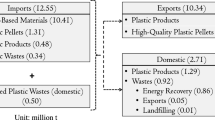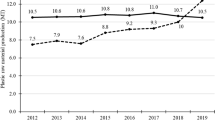Abstract
Plastic waste management is critical and essential for building sustainable cities in the world. This agenda has been backed by the United Nations’ Sustainable Development Goal (SDG) 11. Developed nations consider the impact of waste management and recognise it as a core marketing strategy for green business development, serving as an opportunity to propel a greener economy. However, solid waste management systems in developing countries have been characterised by ad-hoc strategies due to changes in political leadership and the absence of concerted effort and collaborative approaches. This chapter explores the conflicting goals among the government, firms, and consumers towards the management of plastic waste and proposes a tripartite approach towards its sustainable management. A desk-based review of relevant literature was undertaken to further knowledge on the roles and challenges of governments, firms, and consumers and their implications for sustainable plastic waste management. This chapter draws on waste management literature to propose strategies to transform behaviours and coordinated policies to achieve sustainable plastic waste management.
Access this chapter
Tax calculation will be finalised at checkout
Purchases are for personal use only
Similar content being viewed by others
References
Abbott, A., Nandeibam, S., & O’Shea, L. (2011). Explaining the variation in household recycling rates across the UK. Ecological Economics, 70(11), 2214–2223.
Ackah, M. (2017). Informal E-waste recycling in developing countries: Review of metal(loid)s pollution, environmental impacts and transport pathways. Environmental Science and Pollution Research, 24(31), 24092–24101. https://doi.org/10.1007/s11356-017-0273-y
Agyapong, D. (2017). Alternatives for financing waste management: Implications for Ghana’s growing electronic and electrical equipment waste. Asian Journal of Economics, Business and Accounting, 2(1), 1–14. https://doi.org/10.9734/AJEBA/2017/31409
Ajzen, I. (1991). The theory of planned behaviour. Organizational Behaviour and Human Decision Processes, 50(2), 179–211.
Alhassan, H., Asante, F. A., Oteng-Ababio, M., & Bawakyillenuo, S. (2017). Do socio-psychological factors influence households’ willingness-to-pay for improved solid waste management services? Evidence from Ghana. International Journal of Green Economics, 11(3–4), 183–203.
Alhassan, H., Asante, F. A., Oteng-Ababio, M., & Bawakyillenuo, S. (2018). Application of theory of planned behaviour to households’ source separation behaviour in Ghana. Management of Environmental Quality: An International Journal, 29(4), 704–721.
Amoah, A., & Addoah, T. (2021). Does environmental knowledge drive pro-environmental behaviour in developing countries? Evidence from households in Ghana. Environment, Development and Sustainability, 23(2), 2719–2738.
Awortwi, N. (2004). Getting the fundamentals wrong: Woes of public-private partnerships in solid waste collection in three Ghanaian cities. Public Administration and Development, 24(3), 213–224. https://doi.org/10.1002/pad.301
Baker-Brown, D. (2019). The re-use atlas: A designer’s guide towards the circular economy. Routledge.
Barr, S., Ford, N. J., & Gilg, A. W. (2003). Attitudes towards recycling household waste in Exeter, Devon: Quantitative and qualitative approaches. Local Environment, 8(4), 407–421.
Collivignarelli, M. C., Cillari, G., Ricciardi, P., Miino, M. C., Torretta, V., Rada, E. C., & Abbà, A. (2020). The production of sustainable concrete with the use of alternative aggregates: A review. Sustainability, 12(19), 7903.
Demirel, P., & Danisman, G. O. (2019). Eco-innovation and firm growth in the circular economy: Evidence from European small- and medium-sized enterprises. Business Strategy and the Environment, 28(8), 1608–1618.
Denison, D. R. (1984). Bringing corporate culture to the bottom line. Organizational Dynamics, 13(2), 5–22.
Draskovic, N., Temperley, J., & Pavicic, J. (2009). Comparative perception (s) of consumer goods packaging: Croatian consumers perspective (s). International Journal of Management Cases, 11(2), 154–163.
Elhaffar, G., Durif, F., & Dubé, L. (2020). Towards closing the attitude-intention-behavior gap in green consumption: A narrative review of the literature and an overview of future research directions. Journal of Cleaner Production, 122556. https://doi.org/10.1016/j.jclepro.2020.122556
Elkington, J. (1997). The triple bottom line. In Environmental management: Readings and cases, 2. Thousand Oaks, California: SAGE.
Fassin, Y. (2009). The stakeholder model refined. Journal of Business Ethics, 84(1), 113–135.
Ferronato, N., & Torretta, V. (2019). Waste mismanagement in developing countries: A review of global issues. International Journal of Environmental Research and Public Health, 16(6). https://doi.org/10.3390/ijerph16061060
Fobil, J. N., & Hogarh, J. N. (2006). The dilemmas of plastic wastes in a developing economy: Proposals for a sustainable management approach for Ghana. West African Journal of Applied Ecology, 10(1), 221–229.
Freeman, R. E. (1994). The politics of stakeholder theory: Some future directions. Business Ethics Quarterly, 4, 409–421.
Godfrey, L. (2019). Waste plastic, the challenge facing developing countries ban it, change it, collect it? Recycling, 4(1), 3.
Halldórsson, A., Vural, C. A., & Wehner, J. (2019). Logistics service triad for household waste: Consumers as co-producers of sustainability. International Journal of Physical Distribution & Logistics Management, 49(4), 398–415.
Haron, S. A., Paim, L., & Yahaya, N. (2005). Towards sustainable consumption: An examination of environmental knowledge among Malaysians. International Journal of Consumer Studies, 29(5), 426–436.
Hawken, P., Lovins, A. B., & Lovins, L. H. (2013). Natural capitalism: The next industrial revolution. Routledge.
Heidbreder, L. M., Bablok, I., Drews, S., & Menzel, C. (2019). Tackling the plastic problem: A review on perceptions, behaviors, and interventions. Science of the Total Environment, 668, 1077–1093.
Horvath, B., Mallinguh, E., & Fogarassy, C. (2018). Designing business solutions for plastic waste management to enhance circular transitions in Kenya. Sustainability, 10(5), 1664.
Jalil, E. E. (2015). Reverse logistics symbiosis in waste recycling: Investigating municipal systems and household behaviour in England. Doctoral dissertation, University of Hull.
Jalil, E. E. A., Grant, D. B., Nicholson, J. D., & Deutz, P. (2016). Reverse logistics in household recycling and waste systems: A symbiosis perspective. Supply Chain Management: An International Journal, 21(2), 245–258.
Keesman, B. (2019). Market survey waste and circular economy in Ghana. The Hague: Netherlands Enterprise Agency.
Khan, F., Ahmed, W., & Najmi, A. (2019). Understanding consumers’ behaviour intentions towards dealing with the plastic waste: Perspective of a developing country. Resources, Conservation and Recycling, 142, 49–58.
Li, J., Wu, G., & Xu, Z. (2015). Tribo-charging properties of waste plastic granules in process of tribo-electrostatic separation. Waste Management, 35, 36–41.
Litchfield, S. G., Schulz, K. G., & Kelaher, B. P. (2020). The influence of plastic pollution and ocean change on detrital decomposition. Marine Pollution Bulletin, 158, 111354.
Malakahmad, D., Amirhossein, D., Nasir, C. M., Za’im Zaki, M., Kutty, S. R. M., & Isa, M. H. (2010). Solid waste characterization and recycling potential for university technology petronas academic buildings. American Journal of Environmental Sciences, 6(5), 422–427.
Martin, N., Ross, S. R., & Irwin, R. L. (2015). Utilizing community-based social marketing in a recycling intervention with tailgaters. Journal of Intercollegiate Sport, 8(1), 57–81. https://doi.org/10.1123/jis.2014-0128
Nielsen, T. D., Holmberg, K., & Stripple, J. (2019). Need a bag? A review of public policies on plastic carrier bags—Where, how and to what effect? Waste Management, 87, 428–440.
O’Brien, J., & Thondhlana, G. (2019). Plastic bag use in South Africa: Perceptions, practices and potential intervention strategies. Waste Management, 84, 320–328.
Oduro-appiah, K., Scheinberg, A., & Mensah, A. (2019). Existing realities and sustainable pathways for solid waste management in Ghana. 115–143. https://doi.org/10.4018/978-1-7998-0198-6.ch005
Orzan, G., Cruceru, A. F., Bălăceanu, C. T., & Chivu, R. G. (2018). Consumers’ behavior concerning sustainable packaging: An exploratory study on Romanian consumers. Sustainability, 10(6), 1787.
Oteng-Ababio, M. (2007). Private-public partnership in solid waste management in the Greater Accra Metropolitan Area. PhD thesis.
Oteng-Ababio, M., Owusu-sekyere, E., & Amoah, S. T. (2017). Thinking globally, acting locally: Formalizing informal solid waste management practices in Ghana. Journal of Development Societies, 33(1), 75–98. https://doi.org/10.1177/0169796X17694517
Polonsky, M. J. (2011). Transformative green marketing: Impediments and opportunities. Journal of Business Research, 64(12), 1311–1319.
Rodić, L., & Wilson, D. C. (2017). Resolving governance issues to achieve priority sustainable development goals related to solid waste management in developing countries. Sustainability, 9(3), 404.
Saadeh, D., Al-Khatib, I. A., & Kontogianni, S. (2019). Public-private partnership in the solid waste management sector in the West Bank of Palestine. Environmental Monitoring and Assessment, 191(4), 243.
Schall, J. (1992). Does the solid waste management hierarchy make sense?: A technical, economic and environmental justification for the priority of source reduction and recycling. School of Forestry and Environmental Studies, Yale University.
Schnurr, R. E., Alboiu, V., Chaudhary, M., Corbett, R. A., Quanz, M. E., Sankar, K., et al. (2018). Reducing marine pollution from single-use plastics (SUPs): A review. Marine Pollution Bulletin, 137, 157–171.
Schwartz, S. H. (1977). Normative influences on altruism. Advances in Experimental Social Psychology, 10(1), 221–279.
Simmonds, G., & Spence, C. (2017). Thinking inside the box: How seeing products on, or through, the packaging influences consumer perceptions and purchase behaviour. Food Quality and Preference, 62, 340–351.
Song, H. Y., & Yu, R. C. (2018). Optimization of culture conditions for gamma aminobutyric acid production in fermented adzuki bean milk. Journal of Food and Drug Analysis, 26(1), 74–81.
Tonglet, M., Phillips, P. S., & Read, A. D. (2004). Using the theory of planned behaviour to investigate the determinants of recycling behaviour: A case study from Brixworth, UK. Resources, Conservation and Recycling, 41(3), 191–214.
Triguero, A., Álvarez-Aledo, C., & Cuerva, M. C. (2016). Factors influencing willingness to accept different waste management policies: Empirical evidence from the European Union. Journal of Cleaner Production, 138, 38–46. https://doi.org/10.1016/j.jclepro.2016.05.119
Tweneboah-Koduah, E. Y., Adams, M., & Nyarku, K. M. (2020). Using theory in social marketing to predict waste disposal behaviour among households in Ghana. Journal of African Business, 21(1), 62–77.
UNEP. (2018). UN Environment Annual Report. https://www.unenvironment.org/annualreport/2019/index.php
Velis, C. A., Wilson, D. C., Rocca, O., Smith, S. R., Mavropoulos, A., & Cheeseman, C. R. (2012). An analytical framework and tool (‘InteRa’) for integrating the informal recycling sector in waste and resource management systems in developing countries. Waste Management & Research, 30(9_suppl), 43–66.
Wang, F., Huisman, J., Meskers, C. E. M., Schluep, M., Stevels, A., & Hagelüken, C. (2012). The best of-2-worlds philosophy: Developing local dismantling and global infrastructure network for sustainable e-waste treatment in emerging economies. Waste Management, 32(11), 2134–2146. https://doi.org/10.1016/j.wasman.2012.03.029
Wensing, J., Caputo, V., Carraresi, L., & Bröring, S. (2020). The effects of green nudges on consumer valuation of bio-based plastic packaging. Ecological Economics, 178(November 2019), 106783. https://doi.org/10.1016/j.ecolecon.2020.106783
World Bank. (2018). Solid waste management. Retrieved October 11, 2018, from http://www.worldbank.org/en/topic/urbandevelopment/brief/solid-waste-management
World Bank. (2019). Solid waste management. Retrieved August 10, 2019, from https://www.worldbank.org/en/topic/urbandevelopment/brief/solid-waste-management.
Xie, X., Huo, J., & Zou, H. (2019). Green process innovation, green product innovation, and corporate financial performance: A content analysis method. Journal of Business Research, 101, 697–706.
Zen, I. S., & Siwar, C. (2015). An analysis of household acceptance of curbside recycling scheme in Kuala Lumpur, Malaysia. Habitat International, 47, 248–255.
Author information
Authors and Affiliations
Corresponding author
Editor information
Editors and Affiliations
Rights and permissions
Copyright information
© 2021 The Author(s), under exclusive license to Springer Nature Switzerland AG
About this chapter
Cite this chapter
Ofori, D., Appiah-Nimo, C., Dapilah, J.N., Agyekumhene, A. (2021). A Tri-party Approach Towards Sustainable Plastic Waste Management: A Developing Economy Perspective. In: Adae, E.K., Kosiba, J.P.B., Hinson, R.E., Twum, K.K., Newman, N., Nutsugah, F.F. (eds) Responsible Management in Emerging Markets. Sustainable Development Goals Series. Palgrave Macmillan, Cham. https://doi.org/10.1007/978-3-030-76563-7_11
Download citation
DOI: https://doi.org/10.1007/978-3-030-76563-7_11
Published:
Publisher Name: Palgrave Macmillan, Cham
Print ISBN: 978-3-030-76562-0
Online ISBN: 978-3-030-76563-7
eBook Packages: Business and ManagementBusiness and Management (R0)




